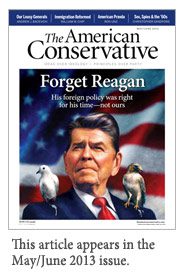Rand Paul’s Realignment

A concept central to our medieval forebears’ understanding of how life works was the wheel of fortune. Whoever was on top would soon be on his way down, and whoever was humble and lowly would find himself on the way up.
If there is any place where the wheel of fortune still turns, it is Washington. There, over the past couple months, the Republican Party’s wheel has begun to revolve. The permanent war faction, with its allies the Pentagon budget-stokers, has tumbled, while the long-despised foreign-policy realists and “cheap hawks,” those who want an effective military at an affordable price, have begun to rise.
Two events impelled the wheel’s movement. In the House of Representatives, the Republican majority, faced by sequestration with a choice between cutting the deficit and protecting the defense budget, chose the former. President Obama did his best to terrify House Republicans with the boogeyman of “undermining our military,” even channeling George W. Bush by speaking at the Norfolk shipyard where our aircraft carriers are built. The Republicans shrugged.
In the Senate, Rand Paul’s filibuster against the use of drones at home marked another turn of the wheel. It was not so much what he said, important as that was—Americans will not enjoy living under constant surveillance and possible obliteration by drones any more than do Pakistanis, Gazans, or Yemenis—rather, it was the reaction to him from establishment Republicans. Led by Minority Leader Mitch McConnell, they supported him. The mouthpiece of the permanent war party, Sen. John McCain, was left spluttering.
The Financial Times, the world’s best English-language newspaper, caught the moment and its import. FT reported on March 11,
The ties that bind Mr Paul and fellow Kentucky senator Mitch McConnell reveal just how influential the conservative Tea Party movement, of which Mr Paul is a favorite, remains within the Republican party and how it is shifting the party’s position on foreign policy. And it marks a challenge to traditional defence hawks such as Senator John McCain, who used to dominate the party.
That “used to” is significant. More so is the fact that Mitch McConnell, up for re-election in 2014, now needs Rand Paul and the rising grassroots forces he represents.
These actions, taken once, become easier to repeat. The fulsome embrace of blowzy, poxy Madame Pentagon, once forgone, looks ever less beguiling.
So far, Republicans’ abandonment of defense spending as their highest budget priority is driven by financial considerations. A majority of House Republicans now recognize that the greatest threat to America’s security is the enormous federal deficit and the ballooning national debt. Debt crises have destroyed more than one great power. Both America’s strength and the Republican Party’s base lie in the middle class, and the usual outcome of a debt crisis, inflation, threatens the middle class with ruin. Inflation wiped out the German middle class twice in the 20th century. Not only can it happen here, on our current course it will. The Tea Party grasps this fact, which means Republican officeholders must also grasp it or be replaced.
What Republican members of Congress thus far have not understood is that clear thinking about national defense also leads to a dramatically smaller defense budget. Almost all our defense spending goes to equip and support forces designed for wars with other states. As we have seen in Iraq and Afghanistan, such forces are not effective against non-state, Fourth Generation opponents. Yet our most vital interest—our interest in maintaining a world of states and not of spreading stateless disorder—dictates that we should avoid war with other states. The question of what the bulk of our armed forces are for, then, is no longer answerable.
As this column warned repeatedly since before our invasion of Iraq, the most likely outcome when we go to war with another state will be the creation of a new stateless region. That will then be another petri dish for the incubation of more Fourth Generation war. This prediction was supported by the outcomes in Iraq and Libya, and it appears on track in Afghanistan as well. The test of any theory is its predictive value, and there seems to be something of a trend here.
 As a growing number of Republicans agree, if the party is to win elections, its policy agenda needs updating. The present agenda, as faithfully represented by presidential candidate Mitt Romney, is as stale as H.M.S. Surprise’s hardtack. By refusing to be panicked into dropping sequestration because it means cuts to the Pentagon, House Republicans began that updating. With their support for Sen. Rand Paul’s filibuster, Senate Republicans laid aside their fear of identifying with foreign-policy realism—a realism our deficits and debts compel. If Republicans can next find the courage to update their defense policy to reflect the challenge posed by Fourth Generation war, the party will, at least in those areas, be addressing the future and not the past. Only then may it hope to ride fortune’s electoral wheel upward.
As a growing number of Republicans agree, if the party is to win elections, its policy agenda needs updating. The present agenda, as faithfully represented by presidential candidate Mitt Romney, is as stale as H.M.S. Surprise’s hardtack. By refusing to be panicked into dropping sequestration because it means cuts to the Pentagon, House Republicans began that updating. With their support for Sen. Rand Paul’s filibuster, Senate Republicans laid aside their fear of identifying with foreign-policy realism—a realism our deficits and debts compel. If Republicans can next find the courage to update their defense policy to reflect the challenge posed by Fourth Generation war, the party will, at least in those areas, be addressing the future and not the past. Only then may it hope to ride fortune’s electoral wheel upward.
William S. Lind is author of the Maneuver Warfare Handbook and director of the American Conservative Center for Public Transportation.
Image: circulating/flickr (cc)
Comments